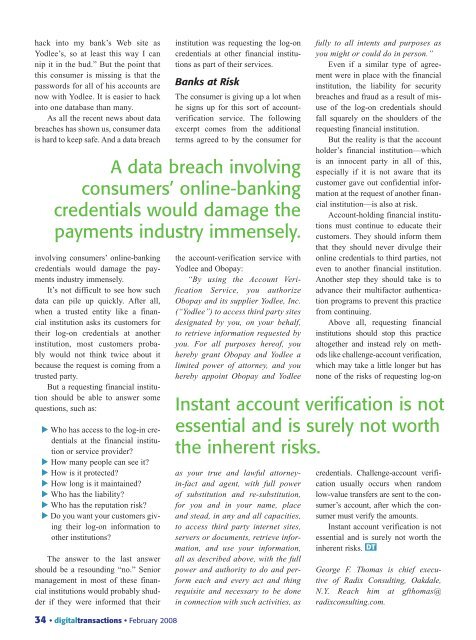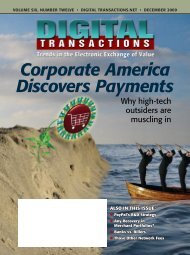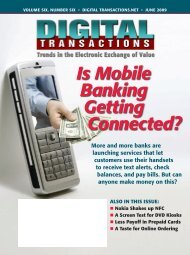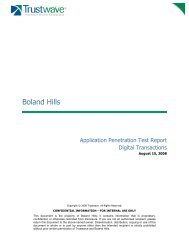The Broken Link - Digital Transactions
The Broken Link - Digital Transactions
The Broken Link - Digital Transactions
Create successful ePaper yourself
Turn your PDF publications into a flip-book with our unique Google optimized e-Paper software.
hack into my bank’s Web site as<br />
Yodlee’s, so at least this way I can<br />
nip it in the bud.” But the point that<br />
this consumer is missing is that the<br />
passwords for all of his accounts are<br />
now with Yodlee. It is easier to hack<br />
into one database than many.<br />
As all the recent news about data<br />
breaches has shown us, consumer data<br />
is hard to keep safe. And a data breach<br />
involving consumers’ online-banking<br />
credentials would damage the payments<br />
industry immensely.<br />
It’s not difficult to see how such<br />
data can pile up quickly. After all,<br />
when a trusted entity like a financial<br />
institution asks its customers for<br />
their log-on credentials at another<br />
institution, most customers probably<br />
would not think twice about it<br />
because the request is coming from a<br />
trusted party.<br />
But a requesting financial institution<br />
should be able to answer some<br />
questions, such as:<br />
Who has access to the log-in credentials<br />
at the financial institution<br />
or service provider?<br />
How many people can see it?<br />
How is it protected?<br />
How long is it maintained?<br />
Who has the liability?<br />
Who has the reputation risk?<br />
Do you want your customers giving<br />
their log-on information to<br />
other institutions?<br />
<strong>The</strong> answer to the last answer<br />
should be a resounding “no.” Senior<br />
management in most of these financial<br />
institutions would probably shudder<br />
if they were informed that their<br />
34 • digitaltransactions • February 2008<br />
institution was requesting the log-on<br />
credentials at other financial institutions<br />
as part of their services.<br />
Banks at Risk<br />
<strong>The</strong> consumer is giving up a lot when<br />
he signs up for this sort of accountverification<br />
service. <strong>The</strong> following<br />
excerpt comes from the additional<br />
terms agreed to by the consumer for<br />
A data breach involving<br />
consumers’ online-banking<br />
credentials would damage the<br />
payments industry immensely.<br />
the account-verification service with<br />
Yodlee and Obopay:<br />
“By using the Account Verification<br />
Service, you authorize<br />
Obopay and its supplier Yodlee, Inc.<br />
(“Yodlee”) to access third party sites<br />
designated by you, on your behalf,<br />
to retrieve information requested by<br />
you. For all purposes hereof, you<br />
hereby grant Obopay and Yodlee a<br />
limited power of attorney, and you<br />
hereby appoint Obopay and Yodlee<br />
as your true and lawful attorneyin-fact<br />
and agent, with full power<br />
of substitution and re-substitution,<br />
for you and in your name, place<br />
and stead, in any and all capacities,<br />
to access third party internet sites,<br />
servers or documents, retrieve information,<br />
and use your information,<br />
all as described above, with the full<br />
power and authority to do and perform<br />
each and every act and thing<br />
requisite and necessary to be done<br />
in connection with such activities, as<br />
fully to all intents and purposes as<br />
you might or could do in person.”<br />
Even if a similar type of agreement<br />
were in place with the financial<br />
institution, the liability for security<br />
breaches and fraud as a result of misuse<br />
of the log-on credentials should<br />
fall squarely on the shoulders of the<br />
requesting financial institution.<br />
But the reality is that the account<br />
holder’s financial institution—which<br />
is an innocent party in all of this,<br />
especially if it is not aware that its<br />
customer gave out confidential information<br />
at the request of another financial<br />
institution—is also at risk.<br />
Account-holding financial institutions<br />
must continue to educate their<br />
customers. <strong>The</strong>y should inform them<br />
that they should never divulge their<br />
online credentials to third parties, not<br />
even to another financial institution.<br />
Another step they should take is to<br />
advance their multifactor authentication<br />
programs to prevent this practice<br />
from continuing.<br />
Above all, requesting financial<br />
institutions should stop this practice<br />
altogether and instead rely on methods<br />
like challenge-account verification,<br />
which may take a little longer but has<br />
none of the risks of requesting log-on<br />
Instant account verification is not<br />
essential and is surely not worth<br />
the inherent risks.<br />
credentials. Challenge-account verification<br />
usually occurs when random<br />
low-value transfers are sent to the consumer’s<br />
account, after which the consumer<br />
must verify the amounts.<br />
Instant account verification is not<br />
essential and is surely not worth the<br />
inherent risks. DT<br />
George F. Thomas is chief executive<br />
of Radix Consulting, Oakdale,<br />
N.Y. Reach him at gfthomas@<br />
radixconsulting.com.







